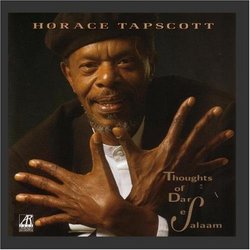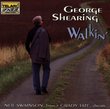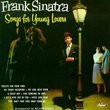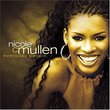| All Artists: Horace Tapscott Title: Thoughts Of Dar Es Salaam Members Wishing: 4 Total Copies: 0 Label: Arabesque Recordings Original Release Date: 8/12/1997 Re-Release Date: 3/5/2009 Genre: Jazz Style: Avant Garde & Free Jazz Number of Discs: 1 SwapaCD Credits: 1 UPC: 026724401282 |
Search - Horace Tapscott :: Thoughts Of Dar Es Salaam
 | Horace Tapscott Thoughts Of Dar Es Salaam Genre: Jazz
Thoughts Of Dar Es Salaam by Horace Tapscott |
Larger Image |
CD DetailsSynopsis
Album Description Thoughts Of Dar Es Salaam by Horace Tapscott Similarly Requested CDs
|
CD ReviewsProfound and playful music Ian K. Hughes | San Mateo, CA | 09/30/2002 (5 out of 5 stars) "Horace Tapscott's last album ( "THOUGHTS OF DAR ES SALAAM", 1997 ), performed in the jazz trio format, is full of excellent compositions ( 4 of 9 written by the leader ) that are diverse in style and substance. Some tunes ( "Bibi Mkuu" ) are reminiscent of McCoy Tyner's open-voiced ( quartal & quintal ) harmonies and pentatonic "cascades" while others ( "Wiletta's Walk" ) echo the "cracked tonality" of Thelonius Monk. "Lullaby in Black" is brooding tune of Scriabinesque gloom while the liltingly sunny "Social Call" ( similar to Dave Brubeck ) is its polar opposite. An interesting ( "bop-meets-Bartok" ) version of Sonny Rollin's "Oleo" is taken at a frighteningly fast tempo.Tapscott's piano playing, while not at the virtuoso level of Tyner or Cecil Taylor, is quite impressive. Through a combination of power and delicacy, he is able to "squeeze" out a full-blooded tone from what ( in lesser hands ) can be a mercilessly colorless instrument. His improvisations ( full of infectious enthusiasm ) are exciting excursions skirting the edge of control: pungent chords, jagged melodic "stabs" and forearm-to-keyboard clusters deployed with Basie-like economy.His musical partners are equally sensitive. Billy Hart's drumming is tightly focused ( artfully restrained ) and Ray Drummond's bass work is tasteful and concentrated ( a gorgeous rounded tone ). This rhythm section is a veritable model for a jazz trio, an ideal support structure for the leader. Prior to listening to this album I was unfamiliar with Horace Tapscott's music. From the perspective proffered by "THOUGHTS OF DAR ES SALAAM", the world is poorer for his absence." Aieee! Horace Tapscott!! Joe Pierre | Los Angeles, CA United States | 01/14/2008 (5 out of 5 stars) "Horace Tapscott died in 1999 the largely unsung hero of the West Coast modern jazz scene and, like Don Pullen who also died too soon, had a refreshingly individual style that never quite garnered widespread acclaim or recording contracts. I saw him live in Los Angeles a few years before his death, and was impressed with his energy and overall technique and, also like Pullen, his ability to stretch between melody and avant garde. I remember when this trio album came out not too much later, I passed because it seemed rather tame... but now on revisitation, having mellowed to not always require frenetic chaos, this is really a delightful album. There are 9 tunes here, recorded in 1996 at a time when Tapscott himself had mellowed, and released on Arabesque -- probably his most straight-ahead, commercial and widely distributed release. The liner notes comment that the date has Tapscott staying uncharacteristically within conventional time signatures, but his style and spirit still abound. One minute a deceivingly breezy, sing-song melody, the next a sprinkled dissonant hammer chord, oft-kilter phrase, or clustered run. Sidemen Ray Drummond (bass) and Billy Hart (drums) do a solid job of keeping pace on a nice, clear recording, and Hart in particular gets generous solo space that allows him to say some interesting things. There is an hour's worth of music here -- 4 originals and 5 tunes penned by others, including Sonny Rollins' "Oleo" and Charlie Parker's "Now's the Time." Hearing the standards, you really get what Tapscott is all about -- listen to the brief and rapid abstraction of the main theme of "Oleo" before it erupts into an extended solo that features plenty of buoyantly angular attacks and power chords. On the originals, Tapscott takes free reign to batter the keys ("Sandy and Niles") when called for, or to open up into orchestral use of the keyboard, similar to McCoy Tyner (on the title track). But even with all the panache, the melody is abundant throughout and to borrow the hackneyed Stanley Crouch/Wynton Marsalis phrase, it all swings. There's even a gentle ballad in "Lullaby in Black." There's really nothing here so 'out there' or aggressive as to invoke a direct comparison to Monk or Pullen or Cecil Taylor, but there are certainly swatches of those players. If anything, Tapscott reminds me most of Andrew Hill. Sadly the comparisons are necessary only because there is so little of the Tapscott discography available. Maybe one day Samuel Jackson will don his Kangol and play Horace in a biopic... it could happen. Until then, though out of print, this is a not-too-hard-to-find, good "introduction" album that displays Tapscott's ideas in fairly straight-ahead fashion, sans horns, and the overall mood is joyous. " Agree with two other reviewers and thought I'd ad the AMG C. Katz | Peoples Republic Of Massachussettes | 12/16/2008 (5 out of 5 stars) "If you are a fan of Monk,Andrew Hill,Mal Waldron or even Cecil Taylor Horace Tapscot is a man you should get to know.Thought I'd write review of this album that has it all from gentle power to beutifull ballds I thought I'd ad Thom Jureks review from Allmuiscguide:
The final album by West Coast pianist and composer Horace Tapscott is one of sublime gentility, reaching harmonic elegance and meditative grace. Accompanied by Billy Hart on drums and bassist Ray Drummond, Tapscott moves through five compositions by others -- including Charlie Parker's "Now's the Time"; Sonny Rollins' "Oleo"; and Gig Gryce's "Social Call," as well as Thurman Greene's "Lullaby in Black" -- and adds four of his own to a set that is unusually devoid of odd time signatures and floating rhythmic techniques. There is a gorgeous waltz in "As a Child" that is big on rigorous attention to harmonic detail and not lilting danceability. Also, during the title track, Hart and Drummond move the four-four time signature into reversals of two-four or six-four and accent the living hell out of every turnaround in the score. Another notable track is the inventive chorded cascades Tapscott lays down in "Bibi Mkuu: The Great Black Lady," where he moves from a restatement of Ramsey Lewis' early version of "Wade in the Water" to an inversion of rhythmic pulse and melody, digging into the middle register for large open chords and angular arpeggios that point back to that source. The tuner rings with authority. If Tapscott would have had more time, there is no telling where he would have gone. Maybe he would have stayed in the same place he'd stayed for 30 years, helping out younger musicians from L.A. But with playing and composition like this, rattling the cage of the neo-trad punks, it's hard to believe they could have overlooked him forever Tracks 1 As a Child Tapscott 7:06 2 Bibi Mkuu: The Great Black Lady Hines 5:34 3 Lullaby in Black Green 3:19 4 Sandy and Niles Tapscott 4:44 5 Wiletta's Walk Tapscott 9:08 6 Social Call Gryce 8:53 7 Oleo Rollins 8:07 8 Thoughts of Dar Es Salaam Tapscott 6:50 9 Now's the Time Parker This album with crack supprt from Ray Drummond and Billy Hart is a beautiful gem.I reccomend Horace Tapscott's autobiography which I rank among the best ever written about muisc and social consciousness from a man who could have been much wider recognized but loved his community in Los Angelas and built a great almost unknown repetoir almost all of which is on the Nimbus West catlogues and much of it is still on CD.Also if you like this his LP with Art Davis and Roy Haynes is well worth the price.A master little known. Cheers Chazz " |

 Track Listings (9) - Disc #1
Track Listings (9) - Disc #1


